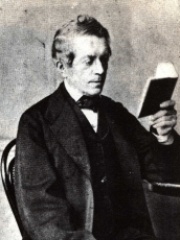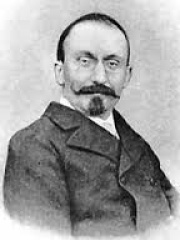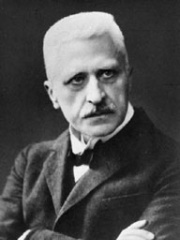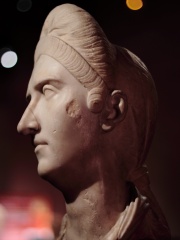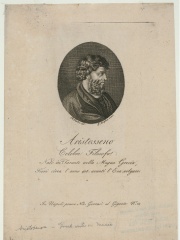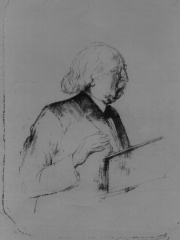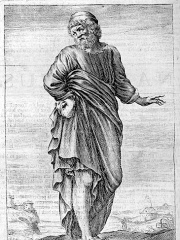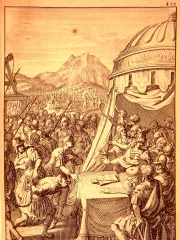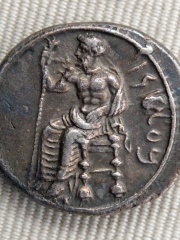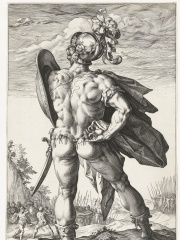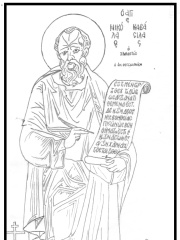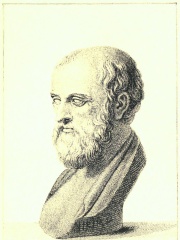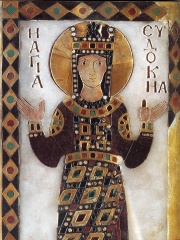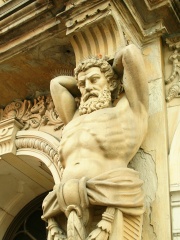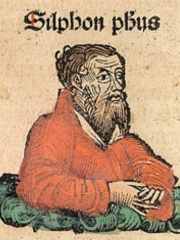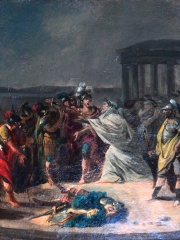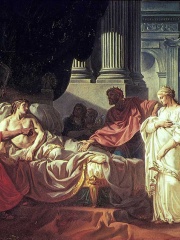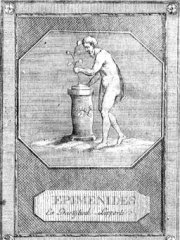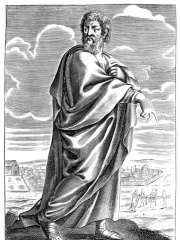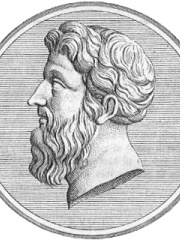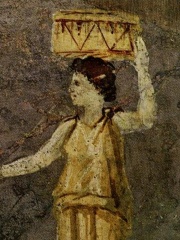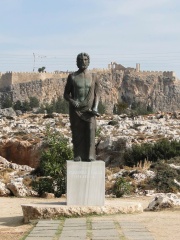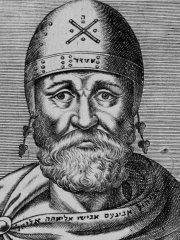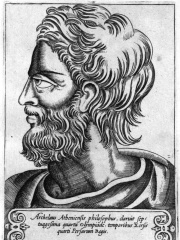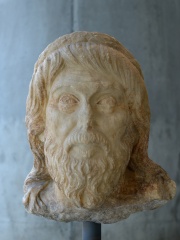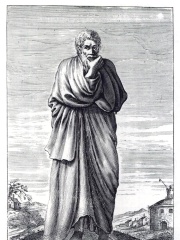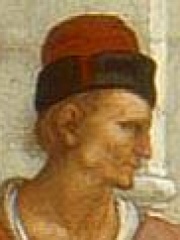Philosopher
Crates of Thebes
365 BC - 285 BC
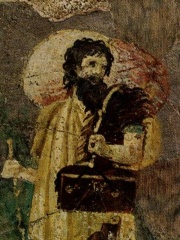
 Crates of Thebes
Crates of Thebes
Crates (Ancient Greek: Κράτης ὁ Θηβαῖος; c. 365 – c. 285 BC) of Thebes was a Greek Cynic philosopher, the principal pupil of Diogenes of Sinope and the husband of Hipparchia of Maroneia who lived in the same manner as him. Crates gave away his money to live a life of poverty on the streets of Athens. Read more on Wikipedia
His biography is available in 33 different languages on Wikipedia. Crates of Thebes is the 349th most popular philosopher (down from 291st in 2024), the 209th most popular biography from Greece (down from 162nd in 2019) and the 31st most popular Greek Philosopher.
Crates of Thebes is most famous for being the birthplace of Oedipus.
Memorability Metrics
Page views of Crates of Thebes by language
Among Philosophers
Among philosophers, Crates of Thebes ranks 349 out of 1,267. Before him are David Strauss, Louis Couturat, Rudolf Otto, Anne Sullivan, Justus Lipsius, and Antonio Negri. After him are Pompeia Plotina, Aristoxenus, Robert Nozick, Hermann Cohen, Günther Anders, and René Girard.
Most Popular Philosophers in Wikipedia
Go to all RankingsDavid Strauss
1808 - 1874
HPI: 69.52
Rank: 343
Louis Couturat
1868 - 1914
HPI: 69.51
Rank: 344
Rudolf Otto
1869 - 1937
HPI: 69.50
Rank: 345
Anne Sullivan
1866 - 1936
HPI: 69.47
Rank: 346
Justus Lipsius
1547 - 1606
HPI: 69.44
Rank: 347
Antonio Negri
1933 - 2023
HPI: 69.41
Rank: 348
Crates of Thebes
365 BC - 285 BC
HPI: 69.38
Rank: 349
Pompeia Plotina
65 - 121
HPI: 69.35
Rank: 350
Aristoxenus
360 BC - 300 BC
HPI: 69.34
Rank: 351
Robert Nozick
1938 - 2002
HPI: 69.33
Rank: 352
Hermann Cohen
1842 - 1918
HPI: 69.32
Rank: 353
Günther Anders
1902 - 1992
HPI: 69.32
Rank: 354
René Girard
1923 - 2015
HPI: 69.32
Rank: 355
Contemporaries
Among people born in 365 BC, Crates of Thebes ranks 2. Before him is Pyrrho. After him are Philotas, and Pharnabazus III. Among people deceased in 285 BC, Crates of Thebes ranks 1. After him is Marcus Valerius Corvus.
Others Born in 365 BC
Go to all RankingsPyrrho
PHILOSOPHER
365 BC - 275 BC
HPI: 76.97
Rank: 1
Crates of Thebes
PHILOSOPHER
365 BC - 285 BC
HPI: 69.38
Rank: 2
Philotas
POLITICIAN
365 BC - 330 BC
HPI: 67.64
Rank: 3
Pharnabazus III
POLITICIAN
365 BC - 310 BC
HPI: 65.98
Rank: 4
Others Deceased in 285 BC
Go to all RankingsCrates of Thebes
PHILOSOPHER
365 BC - 285 BC
HPI: 69.38
Rank: 1
Marcus Valerius Corvus
POLITICIAN
371 BC - 285 BC
HPI: 60.23
Rank: 2
In Greece
Among people born in Greece, Crates of Thebes ranks 209 out of 1,024. Before him are Gazi Husrev-beg (1480), Phoebe (50), Nicholas Kabasilas (1322), Nearchus (-356), Theopompus (-400), and Nicias (-500). After him are Aelia Eudocia (401), Bacchylides (-490), Telamon (null), Stilpo (-359), Idomeneus of Crete (null), and Erasistratus (-303).
Others born in Greece
Go to all RankingsGazi Husrev-beg
POLITICIAN
1480 - 1541
HPI: 69.49
Rank: 203
Phoebe
RELIGIOUS FIGURE
50 - 100
HPI: 69.48
Rank: 204
Nicholas Kabasilas
RELIGIOUS FIGURE
1322 - 1391
HPI: 69.48
Rank: 205
Nearchus
MILITARY PERSONNEL
356 BC - 300 BC
HPI: 69.47
Rank: 206
Theopompus
HISTORIAN
400 BC - 320 BC
HPI: 69.44
Rank: 207
Nicias
POLITICIAN
500 BC - 413 BC
HPI: 69.38
Rank: 208
Crates of Thebes
PHILOSOPHER
365 BC - 285 BC
HPI: 69.38
Rank: 209
Aelia Eudocia
WRITER
401 - 460
HPI: 69.36
Rank: 210
Bacchylides
WRITER
490 BC - 451 BC
HPI: 69.29
Rank: 211
Telamon
POLITICIAN
HPI: 69.16
Rank: 212
Stilpo
PHILOSOPHER
359 BC - 279 BC
HPI: 69.16
Rank: 213
Idomeneus of Crete
POLITICIAN
HPI: 69.07
Rank: 214
Erasistratus
PHYSICIAN
303 BC - 249 BC
HPI: 69.05
Rank: 215
Among Philosophers In Greece
Among philosophers born in Greece, Crates of Thebes ranks 31. Before him are Epimenides (-690), Speusippus (-407), Chilon of Sparta (-600), Hipparchia of Maroneia (-350), Aenesidemus (-80), and Cleobulus (-590). After him are Stilpo (-359), Philo of Larissa (-145), Archelaus (-500), Plutarch of Athens (350), Timon of Phlius (-320), and Eudemus of Rhodes (-370).
Epimenides
690 BC - 600 BC
HPI: 71.11
Rank: 25
Speusippus
407 BC - 339 BC
HPI: 71.04
Rank: 26
Chilon of Sparta
600 BC - 520 BC
HPI: 70.60
Rank: 27
Hipparchia of Maroneia
350 BC - 300 BC
HPI: 70.13
Rank: 28
Aenesidemus
80 BC - 10 BC
HPI: 70.04
Rank: 29
Cleobulus
590 BC - 510 BC
HPI: 70.00
Rank: 30
Crates of Thebes
365 BC - 285 BC
HPI: 69.38
Rank: 31
Stilpo
359 BC - 279 BC
HPI: 69.16
Rank: 32
Philo of Larissa
145 BC - 79 BC
HPI: 68.58
Rank: 33
Archelaus
500 BC - 430 BC
HPI: 68.42
Rank: 34
Plutarch of Athens
350 - 431
HPI: 68.19
Rank: 35
Timon of Phlius
320 BC - 230 BC
HPI: 67.63
Rank: 36
Eudemus of Rhodes
370 BC - 300 BC
HPI: 67.42
Rank: 37
